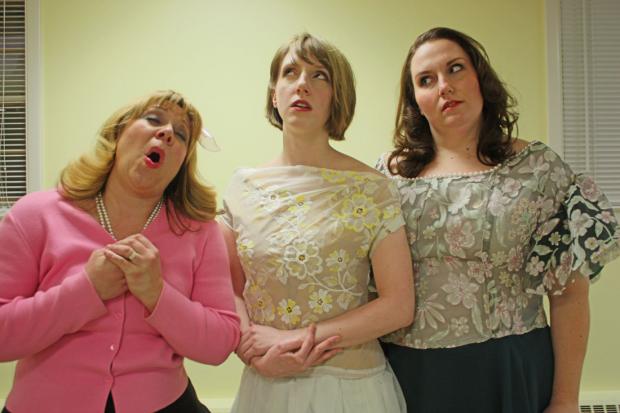Do They All Do It? Cosi fan tutte at Center for the Arts
Cosi fan tutte
Buffalo Opera Unlimited
Friday, March 13 at 8pm and Sunday, March 15 at 2:30pm
Center for the Arts Drama Theater, UB North Campus
The story in a nutshell of Mozart’s comedy, Cosi fan tutte, to be performed by Buffalo Opera Unlimited at the Center for the Arts Drama Theater on UB’s North Campus this weekend, is this: Two sisters are betrothed to a pair of soldiers. The young men are approached by a cynical old bachelor, who makes a bet with them. In their absence, the women will forget their promises and take on new lovers, given the opportunity. The soldiers accept the wager. Saying they’ve been called up to fight, they leave. The bachelor offers to reward the sisters’ maid if she helps him with the ruse. She preps the women, encouraging them to have fun while their lovers are absent. The men, in disguise, flirt with the sisters, each wooing the sister that was engaged to the other. They all agree to marry and sign the contracts sealed by a notary (actually the maid). The men exit briefly and return in their uniforms, resuming their true identities. The trick is revealed by the old bachelor, who tries to calm and make nice with the sisters, saying it was all a joke, and they should go on with their happy lives.
The opera’s title translates idiomatically as “they all do it,” meaning every woman is prone to infidelity and will take on a new lover at the drop of a hat. (“Frailty, thy name is woman,” as Hamlet observed.) And this was an accepted theatrical trope in 18th-century comic theater: couples jumping in and out of each others’ beds, only to make up in the end. “Ha, ha, isn’t life silly?” et cetera.
The opera’s subtitle, “The School for Lovers,” strongly suggests that the two amorous pairs here—Fiordiligi and Guglielmo, Dorabella and Ferrando—are really more in love with love than anything else, and that the play will be their education via the school of hard knocks. School is still very much in session in the 21st century. Today, the man (or woman) who is intimate with someone other than the person with whom he/she is in a relationship (dating, living together, married), when facing the music, will say, “It was just sex, not love,” implying it doesn’t really mean anything. This may elicit a laugh, or a groan, from today’s audience. In Mozart’s day, it wasn’t a big deal, get over it.
So, is Cosi a comedy? Does it have a happy ending? Yes, says baritone Nicholas Kilkenny, who sings the role of Guglielmo. “It is taken very lightheartedly, which makes it easier to swallow than if this were to happen in real life. When we come back as Ferrando and Guglielmo, out of our disguises, we discover the contracts, pretending to be surprised, and we let our ‘rage’ out about the situation, regardless of the fact that we knew what was going on the entire time.” The moment is obviously played for laughs, but could also go the opposite way.
To tenor Robert Zimmerman, in the role of Fernando, it’s a dark comedy. “Da Ponte wrote it as a comedy, but Mozart didn’t set it as one,” he says, maintaining that while the whole approach is comedic, there is nothing about the outcome that is funny. The bachelor, Don Alfonso, who is the mastermind of the entire charade, says at the end it was all a big joke and the lovers should get back together as if nothing happened. “No way you could do that to someone else or could have that be done to you and not be wounded,” says Zimmerman. Throughout Mozart hints musically at feelings quite the opposite to what’s in the text. Since the adoption of naturalism created the art form we know as modern theater, it is easy for farce to also seem tragic, and vice versa, depending upon how it is played.
From today’s standpoint, two and a quarter centuries after it was first produced, the themes of Cosi fan tutte are decidedly politically incorrect. In our post-feminist world, “they all do it” can, or should, just as easily apply to men as to women. But through it all, the genius of Mozart’s music reminds us of the multiple layers of meaning at work in what is otherwise a formulaic commedia dell’arte piece. Mozart takes love seriously; the musical numbers we hear are literally the hearts of his characters. There is the sisterly love between Fiordiligi (soprano Rebecca Witty) and Dorabella (mezzo-soprano); the camaraderie of Ferrando and Guglielmo; the starry-eyed romantic love between the original couples; and the more intense feelings that sudden flare between each woman and her masquerading suitor. Previous productions have taken the implicit ambiguity of Cosi’s conclusion to suggest that Fiordiligi may quit Ferrando and go off with Guglielmo, or the quartet decides, screw this, and will go to find new lovers after the curtain comes down.
All together, Cosi fan tutte is a complex story that rewards close listening to Mozart’s music as much as to Da Ponte’s words, which in Buffalo Opera Unlimited’s mounting will be sung in English. Producer/director Tim Kennedy has set his production in 1950s, so a further delight will be to see how Mozart’s opera, brought to life by its cast of able singers, plays out its school for lovers in Eisenhower’s America.
Tickets are $30 general admission, $20 for seniors, and $10 for students, and are available at Tickets.com or the Center for the Arts box office: 1-800-223-6000.

